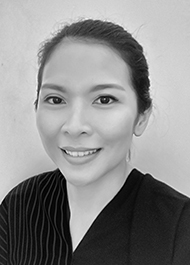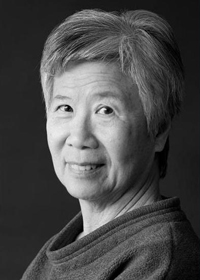Lian Gouw
A native of Indonesia, Lian grew up in Bandung, a mountain city on the slopes of the Tangkuban Prahu, a sleeping volcano in West Java. Her family adhered to strict Chinese traditions inside the home and did not allow her to play with children who might have been attending the Dutch-Chinese school rather than the all-Dutch school she attended. Thus books and blank pages of notebooks became her best friends.
In their zeal to become westernized, the Gouw family encouraged the Dutch habit of reading for pleasure and boasted about Lian’s early accomplishments in penmanship which came in the form of winning writing contests and having pieces published in the school and local newspaper.
The escalating political unrest of WWII followed by the Indonesian Revolution shifted her family’s focus from making sure that she became an independent, professional woman, to making sure that she remained safe and honorable. This led to her marriage and emigration to America which put a halt to her hope to enter the workforce as a writer.
After living in a different country and speaking a second language for nearly four decades, Gouw dedicated herself again to write and discovered that she now wrote most naturally in English rather than in Dutch.
She tells us, “As the characters of Only A Girl one by one stepped forward, I started to write about their lives; first as separate stories then weaving these together into the bigger work.” Seven years and four revisions later, Only A Girl was published by Publish America.
Contact Lian at: onlyagirl2009@gmail.com
Widjati Hartiningtyas

Widjati Hartiningtyas was born in Semarang in February 1983, and lived there until she was 23 years old. Her childhood was filled with stories — from both her grandmother and Sanggar Cerita, a collection of stories, she listened to on audiocassette. The eldest of three siblings, she continued her quest for stories in books. A voracious reader with a changing preference of genre, she currently favors detective stories.
Little “Tyas” showed a great interest in language. English was the first foreign one she learned. Her love of reading and language prompted her to study it in high school and then English literature at the Universitas Negeri Semarang (UNNES).
Tyas also loves to write and started writing short stories in middle school. Her short story in English, The Never Ending Trip, won an award from the Faculty of Language and Literature of UNNES, in 2004. Her stories have been published in various magazines and newspapers: Tarian Terakhir – The Last Dance (Femina, 2017); Kejutan Tengah Malam – A Midnight Surprise (Kompas Anak, 2015); and Membakar Kenangan – Setting Fire to Memories (Cerita Kita, 2006).
After graduating from UNNES, in 2004, Tyas worked as a teacher. Eight years later, after the birth of her eldest daughter, she decided to quit teaching. Tyas is now a freelance translator and writes children’s books. Some of her published work includes: Siap Masuk SD Bersama Piko – Get Ready for School with Piko (PT Tiga Serangkai, 2018) and the series Petualangan Seru Rori – Rori’s Adventures (PT Kanisius, 2017). She lives in Sidoarjo with her two children and can be reached at widjati@gmail.com.
***
Translator’s Note
Language has intrigued me since I was very young. My interest is not only aimed at the Indonesian language, my mother tongue, but also foreign languages. Understanding other languages broadened the perspective of my small world. Unfortunately, not everyone I knew was able to speak a foreign language. My desire to share my knowledge inspired me to become a translator.
Mengadang Pusaran is the first literary novel I translated. When the publisher, Penerbit Kanisius contacted me, I realized that it would be a great challenge, but at the same time, it would be a golden opportunity to learn directly from the author, Lian Gouw.
I came to the realization that adhering to my agreement to not use borrowed words from the English language in my Indonesian language translation was much harder than I anticipated. It was extremely difficult to break a habit that I had practiced for years. Working with this novel reminded me of the importance of using my mother tongue correctly, as language is an integral part of a nation’s identity.
Another important lesson I learned while working on this novel was how to maintain the authenticity of the story’s background. This required a lot of careful research, as phrases and terms that were used during the time the novel took place sometimes took on a different meaning for me, who grew up during the 1980s.
The novel also taught me a lot about Indonesian history, especially about the years toward the end of colonialism and immediately following the Indonesian declaration of independence. The book gave me a chance to see that important period from a point of view I never learned in school: the point of view of the Chinese people.
The political turmoil of the country and the confusion of Jenny, a character in the novel, reminded me of Oma, my late grandmother. She was a Dutch-educated nurse who was very strict and well-organized. She once said that her ability to speak Dutch disappeared right after the Japanese occupation. I can only imagine the fear she had to endure when the Japanese seized all Dutch books and punished anyone who was caught speaking Dutch. Not only did the novel bring back memories of Oma, but it also brought back memories of Bandung, the city which is my second hometown. It was exciting to see the familiar places in Bandung during a different time and under different circumstances.
Mengadang Pusaran is not merely a love story.
While there is much to glean from this novel, I’m most impressed with the struggle of the female characters against the restraints society put upon them. Each female character was a powerful woman in her own way. Whether their sense of independence was “correct” depends on the angle from which one approaches the issue.
I hope that the reader will have a similar, enriching reading experience.
I am deeply grateful to Penerbit Kanisius for this great opportunity, and to Ibu Lian Gouw for the trust she bestowed upon me. I am truly honored to have been able to partake in bringing this novel home.
Happy reading.
Widjati Hartiningtyas
Sidoarjo, 2020




